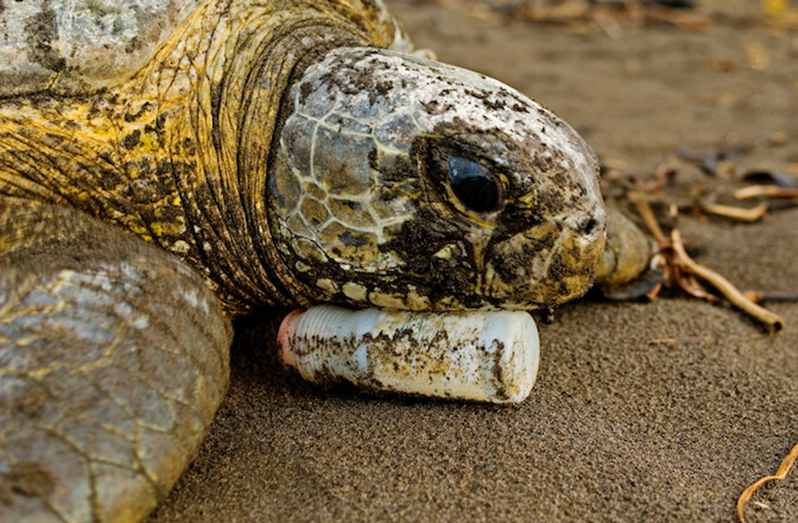THERE are endless marketing campaigns on turtles being harmed by straws in the ocean in the mass media. I’ve read that people even now refer to it as a climate change “cliche”. Some may be sensitised to the idea and some may even now laugh it off. Have you ever wondered though, if a straw you’ve used ever harmed a sea turtle? What if it’s that exact straw that you drank juice from ends up being littered into your drainage, then into your country’s river and then into the ocean and a turtle mistakes it for food? Have you ever thought that far? You see, the “cliche” is simply a term of description used for a larger epidemic. It’s an epidemic that we aren’t paying enough attention to. Every single day, you and I use single-use plastic products. There’s no lie in that statement because we can also indirectly contribute to the use of it. Whether it be plastic bags, plastic packaging covers, food packaging, some may be disposed of into a waste facility or dump site (like what we have in Guyana) and unfortunately, the remainder ends up in our oceans. According to the International Union for Conservation, it is estimated that over 400 million tons of single-use plastic is produced annually around the world and about 14 million tons of what is produced ends up in our oceans. Around 8 million pieces of plastic end up in our ocean every day.
 Now, imagine how lower those numbers would be if every day, each of us actively remembered not to litter or to avoid unrestricted “dump sites” and dispose of our trash in waste bins that will be taken care of by a waste management company or our local community/town council. The world can’t rid itself of waste entirely. It’s nearly impossible for now. However, we can reduce the amount of waste we produce daily. Going back to the famous straw and turtle scenario, there is an actual scientific link to the dangerous plastic by itself. Turtles can mistake it for jellyfish (one of their normal dietary intake). It was proven that plastics can, over time, draw the scent to the ocean it’s in. As such, sea turtles may smell the plastic and mistake it for their own food. Over time, if they consume too much plastic, it can kill them. It is said that it takes 12 consumed straws to kill a turtle. Imagine if 12 specific persons chose to dispose of their straws wisely—it would end up in a waste facility and not in a turtle’s gut. The more I read and understand how disgustingly dirty and filthy our ocean is, the sadder I become because we’re slowly poisoning our planet.
Now, imagine how lower those numbers would be if every day, each of us actively remembered not to litter or to avoid unrestricted “dump sites” and dispose of our trash in waste bins that will be taken care of by a waste management company or our local community/town council. The world can’t rid itself of waste entirely. It’s nearly impossible for now. However, we can reduce the amount of waste we produce daily. Going back to the famous straw and turtle scenario, there is an actual scientific link to the dangerous plastic by itself. Turtles can mistake it for jellyfish (one of their normal dietary intake). It was proven that plastics can, over time, draw the scent to the ocean it’s in. As such, sea turtles may smell the plastic and mistake it for their own food. Over time, if they consume too much plastic, it can kill them. It is said that it takes 12 consumed straws to kill a turtle. Imagine if 12 specific persons chose to dispose of their straws wisely—it would end up in a waste facility and not in a turtle’s gut. The more I read and understand how disgustingly dirty and filthy our ocean is, the sadder I become because we’re slowly poisoning our planet.

Water is our main source of life, yet we do so little to protect the vast majority we currently have. When did you last trip to the sea walls or even the #63 beach in Guyana? You don’t have to look too far for examples of the global dilemma because our home is currently a prime example. We ought to adopt a better approach and culture regarding waste management. Even with public bins, people throw their waste everywhere else, even next to the bin, but not in it. With that in mind, we also need stricter policies and regulations as it relates to waste management in Guyana. I want to urge our community leaders to emphasise the importance of protecting our environment, especially our ocean. It’s a shame that we say Guyana is a land of many waters, but yet still we’ve developed a culture to treat our waterways as if it’s a dumping site.
 We ought to do better. Effective waste management facilities and systems should be established in every community, local clean-up campaigns should be done regularly (not only on occasions), and we as citizens of our land have to work towards ensuring our environments are clean for our future generations to come. Using reusable straws, shopping bags and even developing your own recycling system at home can all be small yet powerful steps to reduce waste. The little things add up in the end. Your household wastage numbers may be small percentages, but it’s still a part of the overall statistics that gigantically adds up at the end of the day. I urge you all to do your part to protect our turtles and all other marine life and our oceans. We’ll regret it if we don’t.
We ought to do better. Effective waste management facilities and systems should be established in every community, local clean-up campaigns should be done regularly (not only on occasions), and we as citizens of our land have to work towards ensuring our environments are clean for our future generations to come. Using reusable straws, shopping bags and even developing your own recycling system at home can all be small yet powerful steps to reduce waste. The little things add up in the end. Your household wastage numbers may be small percentages, but it’s still a part of the overall statistics that gigantically adds up at the end of the day. I urge you all to do your part to protect our turtles and all other marine life and our oceans. We’ll regret it if we don’t.



.jpg)








